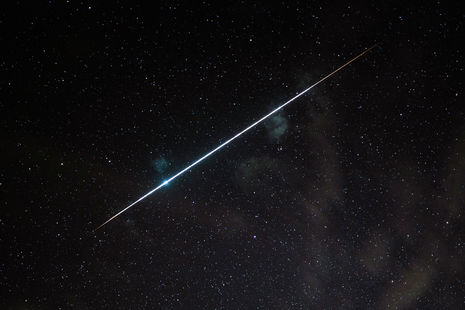Light News – Week 7: A tapeworm drug, an academic prize, success at the Golden Globes and fireball meteors
Varsity gives you the low-down on some lighter news as we enter the seventh week of Lent term

The tapeworm drug that could tackle Covid-19
The University of Cambridge and the Cambridge University Hospitals NHS Trust are beginning trials to investigate whether a drug usually used to treat tapeworms could protect clinically vulnerable kidney patients from Covid-19.
The study is headed by Dr Rona Smith, consultant nephrologist at Addenbrooke’s Hospital and senior research associate at the University of Cambridge. It will look into whether a drug called niclosamide could prevent or alleviate the impact of COVID-19 on dialysis patients, those recovering from kidney transplants and others with auto-immune diseases related to kidney failure.
In early tests, the drug has shown promising signs of inhibiting the virus’ ability to replicate and invade the cells of the upper airways. The latest trial will see 1,500 kidney patients use a nasal spray, containing either niclosamide or a placebo, twice a day in addition to their ordinary treatment for up to nine months.
Kidney patients are at serious risk from Covid-19, and this drug trial is particularly important because their immune response to vaccines can also be less effective. The clinical trial of this tapeworm drug is an opportunity to give vulnerable and immunosuppressed kidney patients another layer of protection in the fight against coronavirus.
Our hospitals are leading a new trial to discover whether a drug used to treat tapeworms can prevent high risk kidney patients getting Covid-19.
- Cambridge University Hospitals NHS (@CUH_NHS) February 26, 2021
Read more 👉 https://t.co/dJUWbzrpu5@Cambridge_Uni @ACTCharity @CambridgeBRC @lifearc1 @Kidney_Research pic.twitter.com/aFQqS14jpg
Is there a post-coronial future?
Simone Eringfeld, a recent Cambridge MPhil graduate, has won the British Educational Research Association’s (BERA) 2021 Masters Dissertation Award. This makes it the third consecutive year that the prize has been won by a student from the Cambridge Faculty of Education.
After being forced by the pandemic to abandon her plans for conducting research in Ugandan refugee camps, Eringfeld shifted her focus onto the ‘post coronial’ future of higher education – with the University of Cambridge as her case study. The final dissertation is an innovative multimedia project, including fragments from her podcast Cambridge Quaranchats, voice memos and even sections of poetry assembled verbatim from segments of various interviews with staff and students.
Simone has published a paper on her conclusions in Studies in Higher Education.
I've not been able to stop dancing: I've WON the BERA Master's Dissertation AWARD!!!
- Simone Eringfeld (@SimoneEringfeld) February 19, 2021
I couldn't feel more proud & happy I created #podcast @CamQuaranchats during the 1st UK lockdown
Thanks to all @CamEdFac members who participated in my #research!https://t.co/mgmOUFSZuw pic.twitter.com/nezkNIwsWz
Cambridge alum crowned with Golden Globe
Emma Corrin, a graduate from St John’s College, Cambridge, has won a Golden Globe for her portrayal of Princess Diana in the most recent season of Netflix’s The Crown.
The actress accepted the award for Best Actress in a Drama Series over video link in London, having won in a competitive race that included her Oscar-winning co-star, Olivia Coleman.
In her acceptance speech, Corrin paid a heartfelt tribute to the late Princess Diana saying: “You have taught me compassion and empathy beyond any measure that I could ever imagine. On behalf of everyone who remembers you so fondly and passionately in our hearts, thank you.”
It was a successful night for The Crown which swept the floor winning four awards. In his own acceptance speech, Josh O’Connor, who played Prince Charles in the series, congratulated his on-screen wife saying "you're extraordinary, talented, funny, and brilliant at playing rock paper scissors. I love you to bits."
It's been a historic night for Emma Corrin at the #GoldenGlobes! She won the award tonight for Best Performance by an Actress in a Television Series - Drama, after receiving her very first nomination in the category. pic.twitter.com/y1GzyLsdXC
- Golden Globe Awards (@goldenglobes) March 1, 2021
We really could do without another extinction crisis...
A few minutes before 10pm on Sunday night (28/02), a record-breaking fireball meteor soared across Cambridge skies. So bright that it could be seen from the Netherlands, the meteor triggered a sonic boom that reverberated across southern England.
The fireball has broken the record for the most reported sightings - with 1078 uploaded on the International Meteor Organisation website at the time of writing. One man from near Ely in Cambridgeshire said that it was the biggest that he had seen in 30 years of observation.
The meteor fragmented during its flight, but its main bulk is thought to have landed in Gloucestershire. The UK Fireball Alliance, a Natural History Museum team responsible for finding and collecting meteorites, have urged the public in a press release to keep an eye out for fragments of debris.
See the fireball meteor that lit up the UK night sky on Sunday. https://t.co/VsK3LixfqH pic.twitter.com/5qLBYUE19T
- The New York Times (@nytimes) March 1, 2021
 News / Cambridge welcomes UK rejoining the Erasmus scheme20 December 2025
News / Cambridge welcomes UK rejoining the Erasmus scheme20 December 2025 News / CUP announces funding scheme for under-represented academics19 December 2025
News / CUP announces funding scheme for under-represented academics19 December 2025 News / News in Brief: humanoid chatbots, holiday specials, and harmonious scholarships21 December 2025
News / News in Brief: humanoid chatbots, holiday specials, and harmonious scholarships21 December 2025 News / SU reluctantly registers controversial women’s soc18 December 2025
News / SU reluctantly registers controversial women’s soc18 December 2025 Lifestyle / All I want for Christmas is a new hanukkiah22 December 2025
Lifestyle / All I want for Christmas is a new hanukkiah22 December 2025









